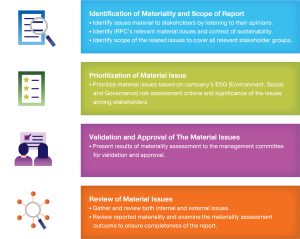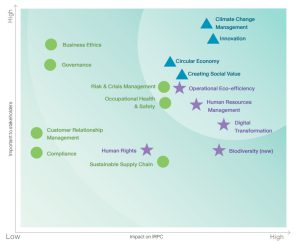Sustainability Materiality
Our Sustainability Report

IRPC has disclosed sustainability performance information to stakeholders through the annual Sustainability Report and the corporate website on a yearly basis. In 2022, IRPC adjusted the disclosure format to take the form of “Annual Registration Statement/Annual Report 2020 (Form 56-1 One Report), combining them as One Report as shown in Section 3 Business driven sustainability, as well as disclosing such information on the website in the Sustainable Development section, as is the case each year, to communicate material issues relating to sustainability of our business operations to all stakeholders. This report also contains current status and progress on the implementation of the United Nations Global Compact (UNGC) by preparing a report in accordance with the guidelines for the Annual Registration Statement/ Annual Report, Form 56-1 One Report, of Office of the Securities and Exchange Commission (SEC) and the Sustainability Reporting Guideline (Standards) of the Global Reporting Initiative (GRI) at the level of Core Option and additional indicators for companies in the Oil and Gas Sector Disclosure. In its latest Sustainability Report 2022, IRPC maintained the scope of reporting on business driven sustainability in Form 56-1 One Report 2022, covering economic, social and environmental operations between January 1 and December 31, 2022, approved by the Board of Directors, the Chief Executive Officer and President as well as high-level executives from relevant departments, and reviewed and audited by KPMG Phoomchai Audit Co., Ltd. to reassure all stakeholders as to its accuracy, reliability and in alignment with the business operation that is also traceable to the sources of information in every respect.
Click here for Material Analysis Report 2022
Scope of the Report
Disclosure of operating results, covering all businesses operated directly or owned by IRPC through shareholding, include IRPC Public Company Limited, as well as subsidiaries under IRPC’s management, with over 50 per cent of shares held by IRPC, are: 1) IRPC Oil Company Limited; 2) IRPC A&L Company Limited; 3) IRPC Technology Company Limited; and 4) iPolymer Company Limited; along with Rakpasak Company Limited, whose shares are held indirectly by IRPC through its subsidiaries, amounting to more than 50 per cent.
Materiality Assessment
IRPC addresses issues that are material to stakeholders and within the context of sustainability. The identified issues cover governmental regulations and megatrends of business operations, such as cybersecurity, climate change, water security, urbanization, and plastic waste management. Moreover, issues that are addressed in reputable organizations, like World Business Council for Sustainable Development (WBCSD), United Nations (UN), United Nations Development Programme (UNDP), RepRisk, SustainAbility, World Economic Forum, SDGs, NSTDA, DJSI, and GRI are taken into consideration together with corporate risk, sustainability management policy, business directions, and operations. Past materiality assessment results are used to prioritize new material issues that affect IRPC’s sustainable business operations and assess the organization’s policy. IRPC’s material issues are disclosed in the organization’s sustainability report and website.
Sustainability Materiality Assessment Procedure

Click here for Stakeholder Profile and Mapping Matrix
Outcome of IRPC’s Sustainability Materiality Assessment

IRPC’s Sustainability Material Issues
IRPC is committed to identifying relevant material issues under the sustainability context by covering all three factors of economic, environment, and social. In accordance to the GRI standard, IRPC ensures that all material issues, scope of impact, and topic reported are reevaluated for each year.
IRPC identified the material issues that encompass high business and stakeholder significance, the assessment result is shown in 2022 One Report.



 Live Stream
Live Stream